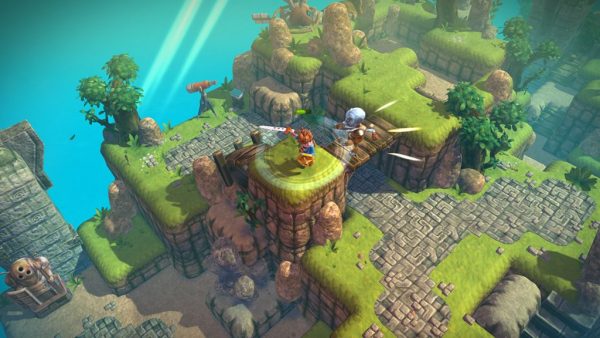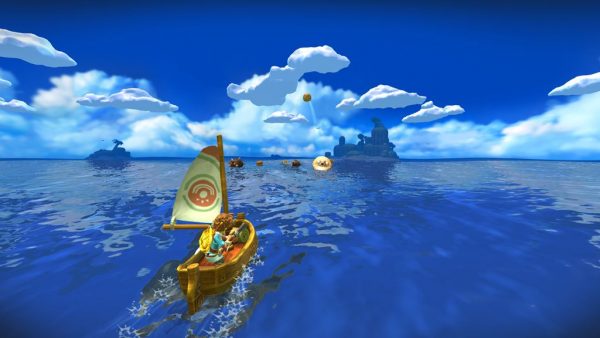Also On: PS4, Xbox One, PC, Switch
Publisher: Cornfox Bros
Developer: Cornfox Bros
Medium: Digital
Players: 1
Online: No
ESRB: E10+
Heresy time: I’ve never been a big fan of The Legend of Zelda. Like, the entire franchise, in all its 30-year glory. I enjoyed 2013’s A Link Between Worlds for reasons that are now lost to me, but beyond that, my general reaction to Zelda games has been, at best, a shrug.
Consequently, you’d probably expect that I’d greet Oceanhorn: Monster of Uncharted Seas with indifference. After all, depending on your perspective, it’s either a loving homage to or a blatant rip-off of the Zelda series. As my colleague Tyler pointed out in his review of the game on Xbox, nearly everything about it, from the hero (a young boy/man), to the plot (you’re fighting an evil that has plagued the land for generations), to the combat, to the life displayed as hearts in the top corner, right down to the fact that blue crystals spill from broken pots and cut shrubs, owes a pretty clear debt to Nintendo’s venerable franchise.
And yet, despite the many (many!) similarities, I find myself enjoying Oceanhorn in a way that, A Link Between Worlds notwithstanding, I never have with Zelda.
I don’t need to think very hard to figure out why that is, either. As Tyler noted, on a console, Oceanhorn probably comes off as a somewhat shallow experience. On a handheld like the Vita, however, you basically get to experience the game as it was meant to be played. After all, the game got its start in the mobile realm; it’s not a huge stretch to see that the distance between a Vita and an iPhone is much less than the gulf between an iPhone and an Xbox. On top of that — from a purely personal perspective — it’s no coincidence that the only Zelda game I’ve ever liked also happens to be the only one I ever played on a handheld system (and that, in general, I tend to prefer handheld games).
What does that mean in practice? In part, I guess, it’s an admission that Oceanhorn probably isn’t on par with, say, Skyrim (or even Breath of the Wild), content-wise. At the same time, though, it’s also a recognition that mobile gaming is a very different beast than what you get on consoles, and by that measure, Oceanhorn is near-perfect. The worlds are essentially distinctive islands, which means you’re never going to have to worry about keeping track of a giant map. None of the islands are particularly huge, so you don’t have to worry about jumping in and out of the game and not knowing where you are. The game also helpfully lets you know what you’ve achieved on each island by percentage, so completists should be pleased.
Most importantly, though, it means that Oceanhorn can be consumed in easily-digestible chunks. There are lots of puzzles to solve and enemies to engage in combat, but neither of those things are so time-consuming that you’ll be in trouble if you need to put your Vita to sleep as you, say, suddenly have to jump out of your seat and run off the bus or subway.
I wouldn’t say that Oceanhorn is flawless, mind you. It’s a little stingy when it comes to save points, which is kind of annoying if you want to, you know, save your game, rather than just putting your Vita to sleep. And also…
Actually, that’s it. That’s my only major problem with Oceanhorn. It’s tailor-made for the mobile experience, and it’s about as exceptional an RPG as I’ve ever played on the Vita.



